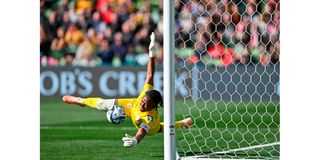Why gender parity features prominently at ongoing Women’s World Cup

Nigeria's goalkeeper Chiamaka Nnadozie saves a penalty kick during the Australia and New Zealand 2023 Women's World Cup Group B football match between Nigeria and Canada in Melbourne Rectangular Stadium, also known as AAMI Park, in Melbourne on July 21, 2023.
What you need to know:
- Female players still grapple with with fewer professional opportunities, massive pay gaps, fewer sponsorships, less airtime, and unequal playing conditions.
- Fifa seeks to shine a spotlight on the challenges, selected following extensive consultations with players and their participating teams.
The push for gender equality is a conspicuous feature of the ongoing 2023 Women’s World Cup that started on Thursday.
UN Women and the International Association Football Federation (Fifa) have come together to advance gender equality in football, and help end abuse and discrimination on and off the pitch.
Globally, women players continue to struggle with fewer professional opportunities, a massive pay gap, fewer sponsorships, less airtime, and unequal playing conditions.
To address some of these challenges and close the gender gap in football, Fifa has also launched a campaign, dubbed Football Unites the World, to highlight major gender equality issues during the global tournament.
Messaging
The campaign will shine a spotlight on a range of social causes, selected following extensive consultations with players and their participating teams. It has come up with eight specific messages, including ‘Unite for Inclusion’ and ‘Unite for Indigenous Peoples’ in partnership with UN Human Rights.
There is also ‘Unite for Gender Equality’ in partnership with UN Women, ‘Unite for Peace’ in conjunction with UNHCR, the UN Refugee Agency and ‘Unite for Education for All’ in partnership with the UN Educational, Scientific and Cultural Organisation (Unesco).
Other key messages are ‘Unite for Zero Hunger’ in support of the UN World Food Programme and ‘Unite for Ending Violence Against Women’ in conjunction with UN Women.
The World Health Organization (WHO) and Fifa also have another message: ‘Football is Joy, Peace, Love, and Hope & Passion’. To further entrench gender equality in global football, Fifa has also raised the prize money for the 2023 Women’s World Cup to $150 million, three times the amount given in 2019, as part of a three-step gender equality plan.
The World Cup, held in Australia and New Zealand, will end on August 20, 2023. This will be the first time 32 nations are competing in the tournament.
UN Women has partnered with Fifa on two calls to action that will feature prominently throughout the tournament. The first, ‘Unite for Gender Equality’, seeks to recognise gender equality as a fundamental human right and critical for a peaceful and sustainable world. The second is ‘Unite for Ending Violence against Women’.
‘Unite for Gender Equality’ was the featured message on the third day, while the call to action against violence will be featured during the semi-finals. The two calls to action will be promoted via the team captains’ armbands, pitch-side digital LED boards, and social media.
“The women competing in this World Cup are role models for every girl on this planet. Their strength and skills are inspirational. At the same time, this tournament is a reminder that there are too many women and girls who are excluded from the world of sport, and that even those who do participate too often experience discriminatory treatment and, even in some cases, abuse,” said UN Women Executive Director Sima Bahous.
Ms Bahous said the tournament shows how much the whole world misses when societies fail to afford women and girls the same opportunities as men and boys.
“Our partnership with Fifa, including on the global ‘Football Unites the World’ campaign, reflects a serious commitment and ambition to addressing that for everyone’s benefit,” she said.
The tournament is expected to be watched by more than two billion people, the largest audience for a single women’s sport in history, offering an opportunity to celebrate women’s achievements in all sports and advocate gender equality generally.





